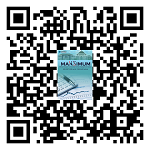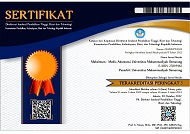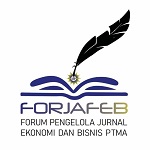Analisis Pengaruh Kecerdasan Emosional, Kecerdasan Spiritual, dan Love of Money Terhadap Persepsi Etis Mahasiswa Akuntansi Mengenai Etika profesi Akuntan (Studi Kasus Pada Universitas Swasta Jurusan Akuntansi Kota Semarang)
(1) Universitas Muhammadiyah Semarang
(*) Corresponding Author
Abstract
Abstract
____________________________________________________________
This research was conducted to determine: (1) the effect of emotional intelligence on the ethical perceptions of accounting students regarding the professional ethics of accountants; (2) The Effect of Spiritual Intelligence on the Ethical Perceptions of Accounting Students Regarding Accountants' Professional Ethics; (3) The Effect of Love of Money on the Ethical Perceptions of Accounting Students Regarding Accountants' Professional Ethics; (4) The simultaneous influence of Emotional Intelligence, Spiritual Intelligence and Love of Miney on Accounting Students 'Ethical Perceptions of Accountants' Professional Ethics. The population in this study were accounting students at the University of Semarang, Sultan Agung Islamic University, Stikubank University, Soegijapranata Catholic University and Dian Nuswantoro University. The sample in this study were 95 respondents. The prerequisite test includes normality test, multicollinearity test, heteroscedasticity test and autocorrelation test. The data analysis technique used to test the hypothesis is multiple linear regression analysis. The results showed that partially Emotional Intelligence had a positive and significant effect on the Ethical Perceptions of Accounting Students Regarding the Professional Ethics of Accountants as evidenced by the regression coefficient value showing the direction of the positive relationship of 0.085 and the sig value of 0.000 <0.050; Spiritual Intelligence has a positive and significant effect on the Ethical Perceptions of Accounting Students Regarding Accountants' Professional Ethics as evidenced by the regression coefficient which shows the direction of the positive relationship of 0.100 and the sig value of 0.000 <0.050; Love of Money has a negative and significant effect on the Ethical Perceptions of Accounting Students Regarding Accountants' Professional Ethics as evidenced by the regression coefficient value which shows the direction of the negative relationship of -0.030 and the sig value of 0.004 <0.050; Emotional Intelligence, Spiritual Intelligence and Love of Money simultaneously influence the Ethical Perceptions of Accounting Students Regarding Accountant Professional Ethics as evidenced by the value of Fcount is greater than Ftable, namely 14.243> 2.70 and a significance value of 0.000 <0.050.
Keywords
Full Text:
PDFReferences
Adinda, K. 2015. Pengaruh kecerdasan emosional dan kecerdasan intelektual terhadap perilaku etis mahasiswa akuntansi dalam praktik pelaporan laporan keuangan. Skripsi, Universitas Diponegoro.
Agoes, Sukrisno. dan Ardana. 2009. Etika Bisnis dan Profesi. Jakarta: Salemba Empat.
Agustini, S. dan N. T. herawati. 2013. Pengaruh kecerdasan intelektual, kecerdasan emosional dan kecerdasan spiritual terhadap sikap etis mahasiswa akuntansi universitas pendidikan ganesha singaraja. Jurnal Ilmiah Mahasiswa Akuntansi S1 Vol 1, No 1
Aprilianto, R. dan Achmad, T. 2017. Pengaruh kecerdasan emosional, kecerdasan intelektual, dan love of money terhadap persepsi mahasiswa mengenai etika profesi akuntan. Journal of Accounting Universitas Diponegoro. Vol. 6, No. 2
Aziz, T.I. 2015. Pengaruh love of money dan machiavellian terhadap persepsi etis mahasiswa akuntansi (studi empiris pada mahasiswa akuntansi uny angkatan 2013 dan angkatan 2014). Yogyakarta: Skripsi, Universitas Negerti Yogyakarta.
Diana, A.R 2017. Pengaruh pengetahuan etika, religiusitas dan love of money terhadap persepsi etis mahasiswa akuntansi. Skripsi, Universitas Negeri Yogyakarta.
Elias, R.Z. dan M. Farag. 2010. The relationship between accounting students love of money and their ethical perception, Managerial Auditing Journal, Vol. 25 269-281.
Ghozali, I. 2011. Aplikasi Analisis Multivariate dengan Program SPSS. Semarang: Universitas Diponegoro.
Goleman, D. 2005. Emotional Itelligence. Jakarta PT Gramedia Pustaka Utama.
Goleman, D. 2005. Kecerdasan Emosi untuk Mencapai Puncak Prestasi. Cetakan Keenam, PT Gramedia Pustaka Utama, Jakarta. Diterjemahkan oleh Alex Tri Kuntjahyo Widodo.
Heider, Fritz. 1958. The Psychology of Interpersonal Relations, New York: Wiley.
Herawan, S dan Wika, N. 2017. Papatkah love of money sebagai variabel intervening pengaruh kecerdasan terhadap persepsi etis mahasiswa akuntansi. Jurnal Ilmiah Akuntansi dan Bisnis, Vol 12, No. 2
Kanter, E.Y. 2001. Etika Profesi Hukum: Sebuah Pendekatan Sosio Religius. Bandung : CV Armico.
Ludigdo. 2004. Mengembangkan pendidikan akuntansi berbasis iesq untuk meningkatkan perilaku etis akuntan. Jurnal TEMA 5 (2): 134-147.
Madison, R.L. 2002. Is failure to teach ethics the casual factor?. Strategic Finance, Vol. 84, pp. 24-6.
Miftah, T. 2003. Perilaku Organisasi Konsep Dasar dan Aplikasinya. Jakarta : PT Raja Grafindo.
Normadewi, B. 2012. Analisis pengaruh jenis kelamin dan tingkat pendidikan terhadap persepsi etis mahasiswa akuntansi dengan love of money sebagai variabel intervening. Skripsi, Universitas Diponegoro.
Pemanyun, A.G.W dan Budiasih, I.A.N 2018. Pengaruh religiusitas, status sosial ekonomi dan love of money pada persepsi etis mahasiswa akuntansi. E-Jurna Akuntansi Universitas Udayana, Vol 32.2
Prandati, N. R. 2014. Analisis pengaruh love of money terhadap persepsi etis mahasiswa akuntansi. Skripsi, Universitas Diponegoro.
Rakhmat, J. 2001. Metode Penelitian Komunikasi. Bandung : PT Remaja Rosda Karya
Riasning, N. P, Datrini, L.K dan Putra, I.M.W. 2017. Pengaruh kecerdasan intelektual, kecerdasan emosioonal dan kecredasan spiritual terhadap sikap etis mahasiswa akuntansi dikota denpasar. Journal KRISNA: Kumpulan Riset Akuntansi, Vol. 9 No. 1
Robbins, S.P. dan Judge, T.A. 2013. Organizational Behavior Global Edition 15th Edition. New Jersey: Pearson.
Said, AN dan Rahmawati, D. 2018. Pengaruh kecerdasan intelektual, kecerdasan emosional dan kecerdasan spiritual terhadap sikap etis mahasiswa akuntansi. Jurnal, Universitas Negeri Yogyakarta. Vol 7 No 1
Sari, G.A 2016. Pengaruh kecerdasan spiritual, kecerdasan emosional, dan love of control terhadap persepsi etis mahasiswa akuntansi. Skripsi, Universitas Negri Padang.
Segal, J. 2000. Melejitkan Kepekaan Emosional Cara Baru Praktis. Bandung: Kaifa
Simorangkir, O.P. 2003. Pengantar Lembaga Keuangan Bank dan Non Bank. Jakarta: Raja Grafindo.
Slameto. 2010. Belajar dan Faktor yang Mempengaruhinya. Jakarta : Rinek Cipta.
Sugiyarti, Siti. 2016. Pengeruh Perilaku Belajar, Preferensi, Gaya Belajar, Kecerdasan Emosional, Kecerdasan Intelektual, dan Kecerdasan Spiritual Terhadap Tingkat Pemahaman Akuntansi Pada Mahasiswa Jurusan Akuntansi Dikota Semarang. Skripsi : Universitas Muhammadiyah Semarang
Sugiyono. 2011. Metode Penelitian Kuantitatif, Kualitatif dan R&D. Bandung: Alfabeta.
Sutrisno, H. 2001. Statistik. Yogyakarta: Andi Offset.
Tang, T.L.P dan Chiu, R.K. 2003. Income Money Ethic, Pay, Satisfaction, Commitment, and Unethical Behaviour: Is the Love of Money the Root of Evil for Hongkong Employees ?. Journal Bussines Ethic, Vol. 46, pp. 542-8.
Tang, T.L.P. 1988. The Meaning of Money Revisited: The Development of the Money Ethic Scale Paper disajikan pada 34th Annual Meeting of the Southwestern Psychological Association. Tulsa. Oklahoma.
Tang, T.L.P. 1992. The Development of a Short Measure of the Money Ethic Scale. Paper disajikan pada 38th Annual Meeting of the Southwestern Psychological Association. Austin. Texas.
Tang, T.L.P., dan Homaifar, B.Y. 2006. Income, the Love of Money, Pay Comparison, and Pay Satisfaction. Journal Managerial Psychology. Vol. 21 No. 5
Teoh, H. 1999. Individualism collectivism cultural diffreneces affecting perceptions of unethical pracrtces: some evidence from Australian and Indonesian accounting students. Journal of Teaching Business Ethics. Vol. 3 No. 2, 137-153.
Yuliansyah, I.Y dan Marzug, M.I 2007. Inspiring heart: Hidup Sukses dengan Kecerdasan Emosional Spiritual. Yogyakarta: Pustaka Marawa
Zohar dan Marshall, 2002. SQ: Memanfaatkan Kecerdasan Spiritual dalam Berpikir Hoistik untuk Memaknai Kehidupan. Cetakan Kelima. Mizan, bandung. Diterjemahkan oleh Rahmi Astuti, Ahmad Nadjib Burhani dan Ahmad Baiqunindari SQ: Spiritual Intellegience-the Ultimate Intellengce.
Article Metrics
Abstract view : 2134 timesPDF - 31 times
DOI: https://doi.org/10.26714/mki.9.1.2019.20-28
Refbacks
- There are currently no refbacks.
-----------------------------------------------------------------------------------------------------------------------------------------------------------------------------------
 | MAKSIMUM: Media Akuntansi Universitas Muhammadiyah Semarang |
![]()
Maksimum: Media Akuntansi Universitas Muhammadiyah Semarang is licensed under a Creative Commons Attribution Attribution-NonCommercial-NoDerivatives 4.0 International License.

















